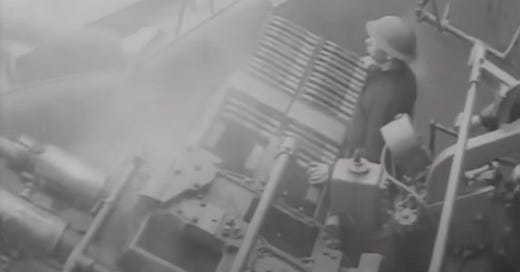VE Day: We did it before. We can do it again.
The battle over the historical memory of WW2 may have only just begun
Jim was an artificer on HMS Indefatigable when it got hit by a Kamikaze. Were you scared?, I asked him. “You had all your mates with you,” he said.
Frank was sunk on a destroyer in the Atlantic. I only knew him as an affable uncle, a shop steward obsessed with horse racing.
Laurie was a bass player in my father’s dance band; he told us that, when training to be a navigator in a Lancaster he had “accidentally bombed Blackpool”.
Jack was an officer in the REME. “Have you even been near a tank?” he once asked me; “go anywhere near them and they take the skin off your hand”.
These were the Second World War veterans I met as a child and in early adulthood. As a TV reporter I got to interview a black veteran of the US landing at Omaha Beach, who was campaigning against air pollution in Port Arthur, Texas. “We were on the beach all day,” he wheezed at us though an oxygen mask. “What were you doing?” my producer asked. “Shootin’,” came the one-word reply.
What strikes me now about the ordinary people who lived through the Second World War is how little they knew about the bigger picture, and how little they were interested in it afterwards. Most wanted to put it behind them as a bad memory.
Today we know a lot more about the events of 1939-45: the story of Ultra and Bletchley Park only came out in 1974; the government only acknowledged the existence of the SAS in 1952; the stories of SOE operatives were only fully declassified decades later.
There are entire podcast series today about major military operations that my Dad’s generation knew nothing about. Before the TV series The World At War came out, in 1973, all my parents had to rely on were war films, which they scorned because they (a) lacked realism and (b) gave agency mainly to the officer class.
Some war films gave a reasonably accurate account of the operational dynamics: The Battle of Britain, Sink the Bismarck, The Dam Busters and The Battle of the River Plate fall into that category – with A Bridge Too Far setting a new high bar in its three-and-a-half hour retelling of the command decisions made during Operation Market Garden, and their consequences.
However, most war movies were human vignettes: glimpses of heroism and cowardice, fear and bravery, love and loss amid circumstances that people had little control over.
But the history of the Second World War is still being fought over – above all by Russia, who will tomorrow stage a grotesque parade whose messaging will equate Putin’s invasion of Ukraine with the Soviet defeat of Nazism.
Putin, for example, blamed Poland for starting the war – carefully exonerating the USSR for the Molotov-Ribbentrop Pact.
Putin has even rewritten school textbooks to date the start of the war as the Munich Agreement of 1938, when the Allies permitted Czechoslovakia to be dismembered, and has become obsessed with the idea that Japan wanted to conquer Eurasia.
Xi Jin Ping, too, is obsessed with reinterpreting the war, signing a joint declaration with Putin last year that pledged “never to permit the desecration or destruction of the correct historical memory of the fight against fascism in World War II.”
What this means in practice is to equate the democratic and largely disarmed countries of Germany and Japan today with the aggressive imperialism they practised in the 1930s, and to exonerate the aggressive imperialism being practised by Russia and China today.
So the war over the interpretation of the war is not over. If Russia were to conquer Ukraine, within a decade its surviving schoolchildren would be learning that their nationality was essentially fascist. If Xi makes good his desire for China to become the dominant power on the planet by 2049, we may all have to accept what’s in the Maoist history textbooks.
Keep reading with a 7-day free trial
Subscribe to Conflict & Democracy to keep reading this post and get 7 days of free access to the full post archives.




